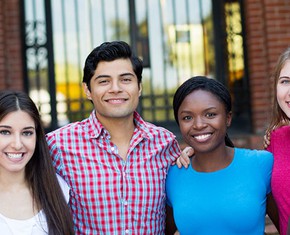The views expressed in our content reflect individual perspectives and do not represent the authoritative views of the Baha'i Faith.
If you or a loved one has not directly experienced racism, you may think it will not affect your life—but let’s see if I can convince you otherwise.
I’m a white woman, but even in my own personal experience, I have witnessed blatant forms of racism directed at friends and loved ones.
For example, one evening I planned to go dancing with my African-American co-workers. We all looked forward to a fun night out. But when we arrived at the club, the bouncer intended to force my co-workers to pay the full price—and offered to let me in free of charge. I left in disgust at such an assumption of privilege, and our evening was ruined.
In that moment, I personally realized the insidious nature of racism. I had been far removed from its effects, so I resolved to take every opportunity to speak out when others were denied equal access and treatment.
In polls, most people characterize racism as inherently wrong and unethical. Consciously, even if you may think it doesn’t directly influence your life, you probably believe in eradicating prejudice and racism. But we all have absorbed at least some of the general prejudices of our cultures, so racism can exist subconsciously and afflict even the most well-intentioned among us.
Ideally, we should all stand up against prejudice and discrimination of any kind, but many people may not be motivated to change their belief systems until they realize that racism negatively impacts their own lives. Racism inadvertently hurts everyone, for several different reasons.
In order for us to fully realize our capacity and potential as human beings, the Baha’i teachings say, every person must have equal access to all the opportunities life offers. When society holds down some of its members, it also holds down all of its members:
Prejudices of religion, race or sect destroy the foundation of humanity. All the divisions in the world, hatred, war and bloodshed, are caused by one or other of these prejudices. – Abdu’l-Baha, Paris Talks, p. 131.
… to learn how best to work for the good of humanity … seek how prejudices may be abolished, and the seed of love and universal brotherhood sown in the heart of man. – Ibid., p. 24.
Here, I’d like to suggest three basic reasons why we must eliminate prejudice and discrimination of any kind:
1. Freeing Untapped Human Knowledge and Potential
Imagine that the cure for cancer currently resides, at least potentially, in the mind of a five-year-old African-American girl living in the U.S. If she does not have the same opportunities as other children, she may never fully realize her potential. But if we all work to ensure she and others like her receive an equal education, it may save many lives at some point in the future.
My mother has battled cancer twice, and the discovery of a cure for this unrelenting disease would change my life—and hers—forever. Can you imagine the impact of such a discovery, on all people?
When individuals do not have equal opportunities, every one of us suffers. As the Baha’i teachings say, those prejudices “destroy the foundation of humanity.”
Racism hurts us even when we don’t realize it, and even though it may occur in faraway places. Currently, many people of color living in previously colonized impoverished nations perform back-breaking manual labor because they lack equal access to educational and employment opportunities as their parents and grandparents never had the financial benefits afforded to the privileged. Those people could use their mental capital to serve humanity. Machines, waiting for capable people to invent and build them, could perform these repetitive physical tasks. If we worked to rid the world of racism, scientific and technological ingenuity could be used for new discoveries, societal progress, and attaining unlimited human potential.
2. Immigration—and the Racial Diversity that Comes With It—Contributes to a Prosperous Economy
Studies show that immigrants deliver a net economic and human resources benefit to thriving nations. Regardless, anti-immigrant sentiments are widespread—most especially for people with darker skin. Compare, for example, the differences between the southern and northern borders of the United States. Immigration from the south, mostly comprised of darker-skinned people, draws much more opposition and controversy than immigration from the north.
Immigrants are often blamed for a struggling economy and taking the jobs of native-born citizens. In the United States, this has become a common myth. However, research has demonstrated that immigrants do not take jobs away from American workers—but rather do work that Americans won’t do, or create new jobs by starting new businesses. Immigrants also spend their income on American goods and services, pay taxes, and raise the productivity of U.S. businesses.
Therefore, immigrants typically boost wealth in a nation’s economy, add diversity to the culture, help countries with declining birth rates stay solvent—and should be welcomed. After all, a manmade national border should not separate us from our fellow human beings:
It is not for him to pride himself who loveth his own country, but rather for him who loveth the whole world. The earth is but one country, and mankind its citizens. – Baha’u’llah, Tablets of Baha’u’llah, p. 167.
Let not conventionality cause you to seem cold and unsympathetic when you meet strange people from other countries. Do not look at them as though you suspected them of being evil-doers, thieves and boors. You think it necessary to be very careful, not to expose yourselves to the risk of making acquaintance with such, possibly, undesirable people.
I ask you not to think only of yourselves. Be kind to the strangers, whether come they from Turkey, Japan, Persia, Russia, China or any other country in the world.
Help to make them feel at home; find out where they are staying, ask if you may render them any service; try to make their lives a little happier.
After all, why should any foreign people be treated as strangers? …
Put into practice the Teaching of Baha’u’llah, that of kindness to all nations. – Abdu’l-Baha, Paris Talks, pp. 15-16.
3. The Contributions of Ethnically Diverse Individuals Have Already Enriched Our Lives
In 1893, the African-American surgeon Daniel Williams performed the first successful open heart surgery. Luis Miramontes, a Mexican-American inventor and chemist, co-invented the contraceptive pill. Examples like these abound, proving that we all benefit from the countless contributions of diverse individuals. Their discoveries and inventions have transformed humanity and made our world a much better place. Unfortunately, their innovations and advancements may not be widely known or noted in history books, which often fail to mention the unique contributions people of color have made to the advancement of our world:
Let them look not upon a man’s color but upon his heart. If the heart be filled with light, that man is nigh unto the threshold of his Lord; but if not, that man is careless of his Lord, be he white or black. – Abdu’l-Baha, Selections from the Writings of Abdu’l-Baha, p. 113.
Racism hurts us even when we don’t recognize it. White privilege hurts rather than helps people, too, because it perpetuates racism. It is an illusion to believe being treated better than someone else will ultimately serve you. We are all connected, and an injustice to another is an injustice to us all. The vision of racial unity prescribed in the Baha’i teachings asks us all to develop a heightened awareness and activism around the eradication of racism. We must stand up for others—it’s our job and responsibility to prevent such forms of prejudice and discrimination, regardless of our color or racial background.
With continued diligence and consciousness, we can all seek to bring about a new world where every child is viewed as a gem with the unlimited potential to serve humankind:
The diversity in the human family should be the cause of love and harmony, as it is in music where many different notes blend together in making the perfect chord. If you meet those of different race and color from yourself, do not mistrust them and withdraw into your shell of conventionality, but rather be glad and show them kindness. Think of them as different colored roses growing in the beautiful garden of humanity, and rejoice to be among them. – Abdu’l-Baha, Paris Talks, pp. 52-53.
















Comments
Sign in or create an account
Continue with Googleor